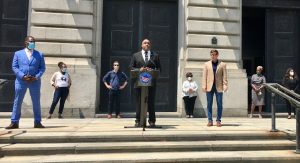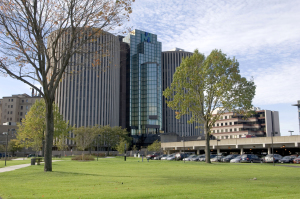By Kelley Kauffman, MSN, APRN-CNP, PMHNP-BC, Center for Health Equity Engagement Education and Research
The U.S. Office of Disease Prevention has recognized the negative impact discrimination has on the health in a community. The COVID-19 pandemic has only served to further highlight the disparities in the economic and health systems. These disparities are not new. They stem from the historic impacts of slavery, Jim Crow laws, and redlining of neighborhoods.
In the last 2 weeks, there have been protests and unrest across the country (and even abroad) in response to the death of George Floyd, an unarmed black man who was pinned to the ground by Minneapolis police. The protests, though, speak to a larger frustration and anger over years of disparities, discrimination, and systemic racism, including a criminal justice system that seems poised against Black communities.
On June 1st, Cleveland City Council held a hearing to consider a resolution to declare racism a public health crisis. The legislation would formally recognize racism as a public health crisis by way of discrimination. Guidelines from the Centers for Disease Control and Prevention require cities to take action once they have declared an issue a public health crisis. Councilman Blaine Griffin, who cosponsored the legislation with Councilmen Basheer Jones and Kerry McCormack, said that study groups with representation from organizations like the NAACP, the Urban League of Greater Cleveland, United Way of Greater Cleveland, Birthing Beautiful Communities, the YWCA of Greater Cleveland and First Year Cleveland will develop plans for action to eliminate some of the disparities.

At a news conference on June 5th, it was announced that the resolution had passed but that no funds had been allocated to tackling this public health crisis. Councilman Jones offered some suggestions of what may occur in response to this resolution: putting pressure on major corporations and nonprofits to bring more minorities onto their boards and executive teams; the city should consider diversity in deciding which businesses to reward with city work; improve diversity in city government; and boost minority representation in it’s safety forces (Mayor Jackson noted that half of the cadets in the most recent police class were minorities).
So all in all, racism continues to plague the health and well-being of Black communities but in Cleveland, Ohio, the city has taken the first step towards change. The city council formally and publicly acknowledged and asserted that racism is a public health crisis that needs to be remedied. They just don’t have any funds to tackle a problem that will need a lot of money to even begin to turn the tide. I, along with many others, hope that the momentum of protests and unrest felt across this nation continues to push our leaders into action. It is the people who will be the seeds of change and they’ve sown the first, of hopefully many, here in Cleveland.
References:
- Cleveland Poised to Declare Racism a Public Health Crisis with Deep Impact on Society
- Declaring Racism a Health Crisis in Cleveland Labeled a “Start”, the Real Work Will be Finding the Solutions


